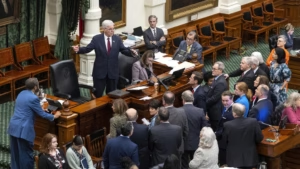The conservative Union alliance, consisting of the Christian Democrats (CDU) and the Christian Social Union (CSU), emerged as the winners of the 2025 federal election in Germany, securing approximately 28% of the vote. Although this result fell short of the Union’s target of over 30%, it still puts them in a strong position to form the next government.
CDU leader and chancellor candidate Friedrich Merz declared victory on election night in Berlin, but the celebrations were muted as the party had hoped for a stronger performance. With the secured percentage not high enough to govern alone under Germany’s electoral system, the CDU/CSU will need to form a coalition with other parties to achieve a majority.
Among potential coalition partners mentioned are the Social Democrats (SPD) and the Greens, which were also members of the outgoing government. Both parties suffered significant losses: the SPD had its worst election result since 1890 with around 16% of the vote, and the Greens managed to mitigate their losses slightly but did not achieve their desired outcome.
The populist Alternative for Germany (AfD) came in second, nearly doubling its share from the last election to around 20%. Despite this increase, which suggests a notable shift in voter sentiment, the CDU/CSU has ruled out forming a coalition with the AfD due to fundamental policy differences. In response to their gain, AfD co-leader Alice Weidel suggested that cooperation with the CDU/CSU could help fulfill certain campaign promises, but Merz insisted that such a partnership is not feasible.
Additionally, the Left Party secured its place in the Bundestag with more than 8% of the vote, in part due to the collapse of Sahra Wagenknecht’s Alliance, which drew significant support away from the Left Party.
The election results highlight challenges for the next government, including significant economic issues and the need for coalition negotiations. With the world watching, there is pressure on Germany’s political leaders to quickly form a stable government that can address both domestic and international challenges effectively.
Source: https://www.dw.com/en/germany-s-future-what-s-next-after-vote-for-change/a-71726769?maca=en-rss-en-all-1573-rdf








